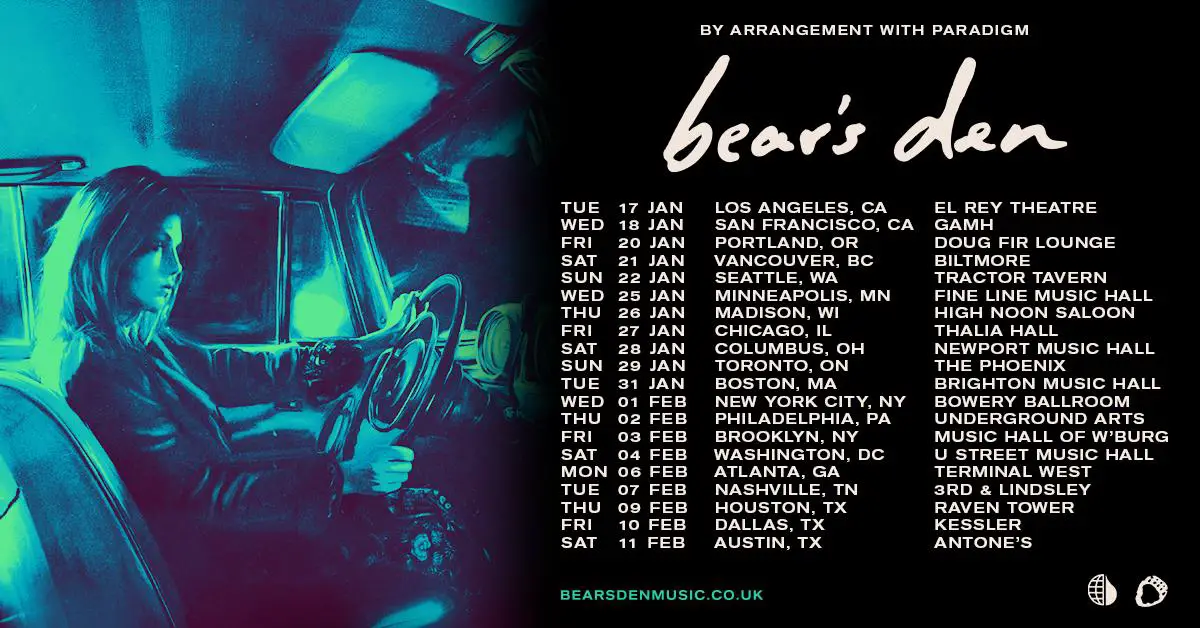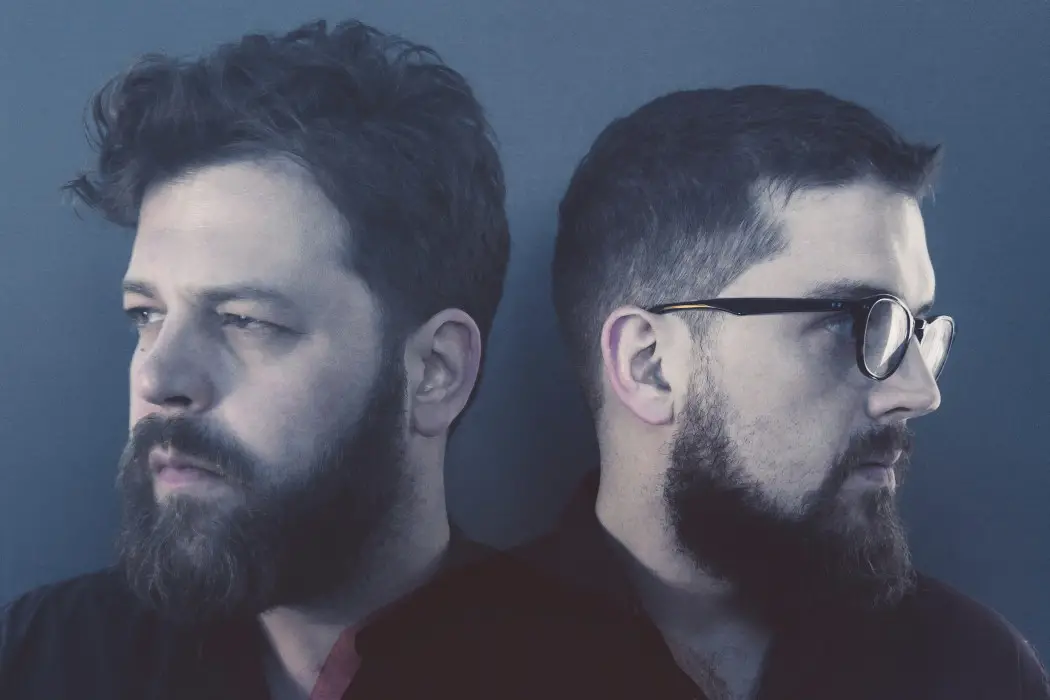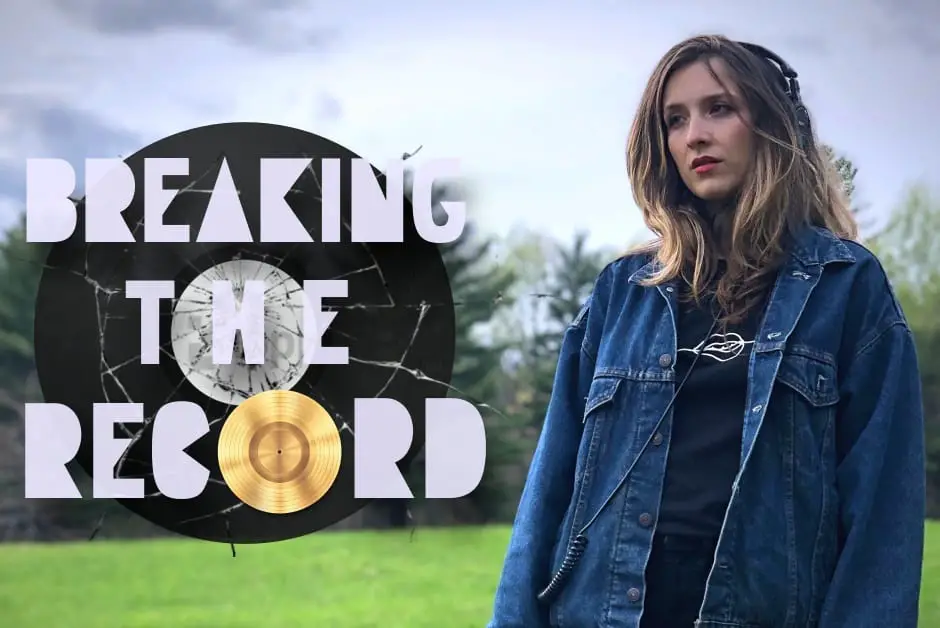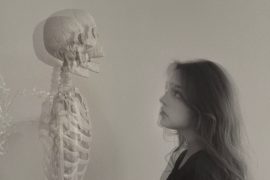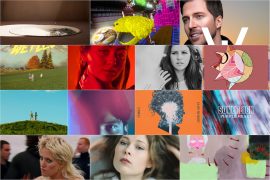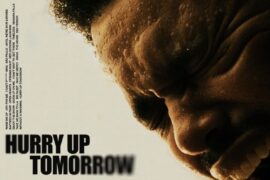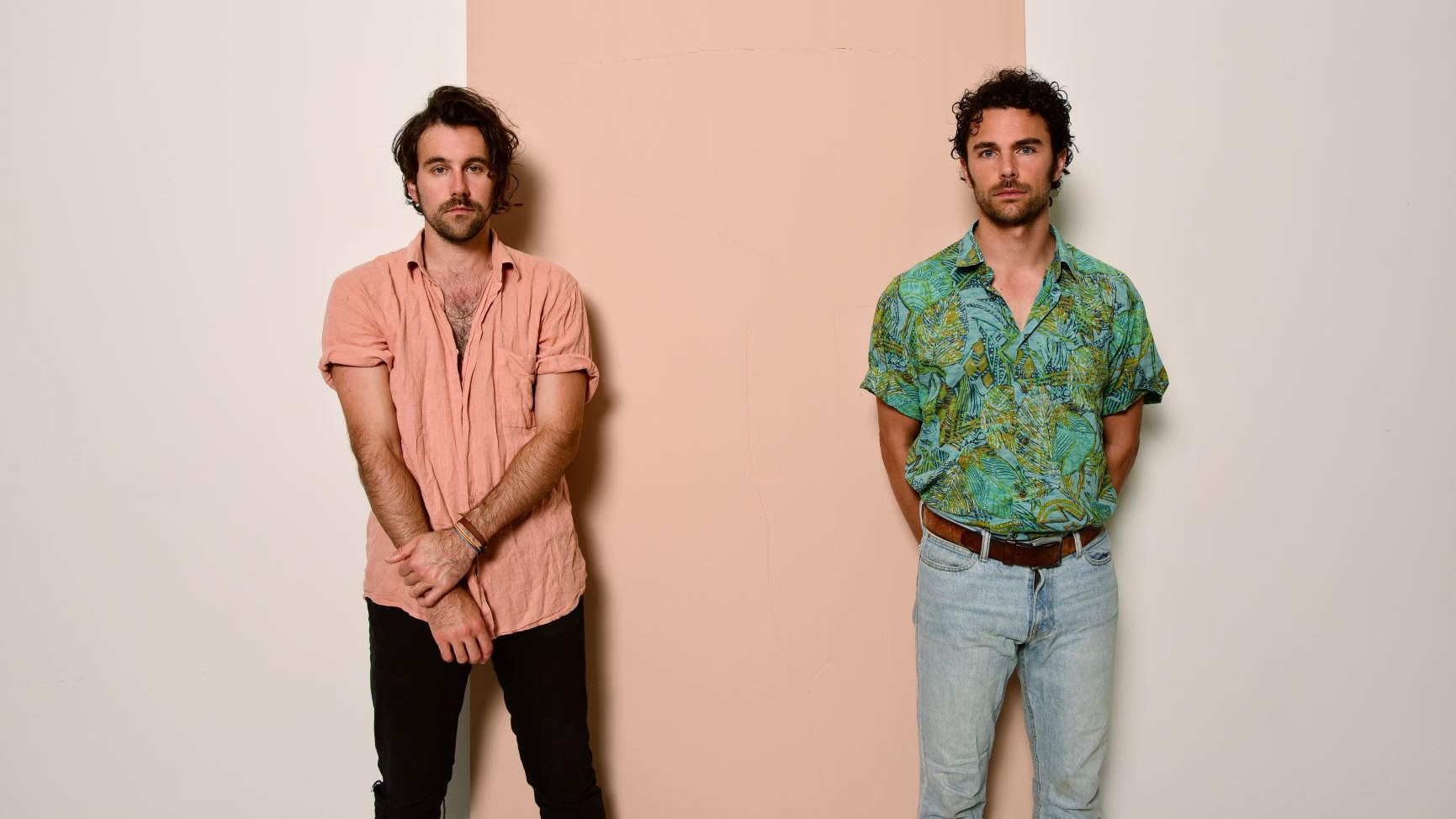I’m drawn to writing about things when I feel like I’m in a difficult place.
There’s an intimacy about Bear’s Den’s music that cuts deeper than most. Lead singer and songwriter Andrew Davie tends to avoid the well-traveled roads of love and romance; his introspective lyrics dive far below the surface, exploring the intricacies of human experience and the relationships that lie within. Friendship and family; life, loss, strength, and illness; memories of the past versus the present – these universal facts of life are examined with an especially personal touch to foster vivid connections between both listener and music, as well as listener and artist.
That was always Bear’s Den’s goal – “to bridge the gap between band and audience,” Davie describes. In opening up on songs like “Sophie,” “Above the Clouds of Pompeii,” “Auld Wives,” “Gabriel” and more – whether he’s telling his story, or relaying someone else’s – Davie and fellow bandmember Kevin Jones offer listeners an emotionally powerful and spiritually meaningful musical experience.
You took me walking through the town
Showed me the statues underground
Said just don’t they look in peace
Sometimes I wish that was me
“Above the Clouds of Pompeii” – Bear’s Den
It’s a part of me, Gabriel
I wish I could deny
The face that I can barely recognise
He lives inside of me
Every day of my life
And I can hear him, screaming in the night
“Gabriel” – Bear’s Den
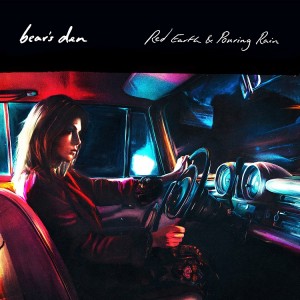
On their 2014 debut album Islands (Communion), Bear’s Den employed a variety of largely folk and Americana-influenced instrumentation to evoke musical feeling and substance. The juxtaposition of light, acoustic music with heavy concepts allowed the band to reserve crescendos for only the biggest moments, and jumps between nothing and something could be felt with dramatic force.
Bear’s Den’s recently released sophomore album, Red Earth & Pouring Rain (7/22/2016 via Communion), presents the band’s growth and progression over the past two years. “We had this idea of creating a mood, and that mood being ‘driving through the night,'” explains Davie. Atmospheric synth pads, drum machines, and an overall sense of urgency contribute to Red Earth & Pouring Rain‘s heavier sound; indeed, the music does capture the mood Davie and Jones set out to create, while staying true to that expressively raw, human element.
Whether it’s layered with atmospheric electronics or sonically bare and acoustically vulnerable, Bear’s Den’s unique songwriting hits home in all the right ways. Atwood Magazine spoke to Andrew Davie about his personal relationship with his words and Bear’s Den’s evolution in our exclusive interview.
Watch: “Dew on the Vine” – Bear’s Den
A CONVERSATION WITH BEAR’S DEN
Atwood Magazine: Davie, thank you so much for your time today!
Andrew Davie: No worries, no worries.
I was at one of your New York shows at Rough Trade earlier in the year... Your performance was absolutely stunning.
Davie: Yeah? Those shows were so fun!
It was such an intimate environment... I feel as though that's one of the things that Bear's Den is best at.
Davie: Oh, man that’s very, very kind! Thank you so much!
Now, you just recently finished up your North American tour and are just beginning your European tour?
Davie: Exactly. Yeah, it’s been pretty busy, but it’s great. It’s just really nice to get out and play new songs.
There's such a different sound with the new record!
Davie: It feels like it’s grown and evolved quite a lot from playing live. I think from touring the first album, our songs were kind of growing into a different sound, and then we went in to record our second album, and everything felt quite natural to move on to the different instruments and stuff, so yeah – it’s just really nice to play them now!
So the songs themselves started out as blueprints on Islands, and developed into something more over time?
Davie: Definitely. I think we’ve always thought of ourselves as a live band. We were playing a bunch of the songs on Islands for a few years, and they kind of grew into the songs that we then recorded onto that album. When we finished recording it, those songs then grew on the road again, and then we were writing new stuff and then went into the studio… It sort of felt like perhaps quite a big leap from record to record, but if you’ve kind of been to our shows in the interim, I don’t know – maybe it feels more explainable or understandable? Like, we were kind of moving in that direction already.
As somebody who writes songs as well, what I can attest to is that there isn't a conscious shift; it just grows and changes over time.
Davie: Totally, yeah I completely agree with that. It definitely didn’t feel like we sat down one day and went, “We’re going to write songs like this now.” It was more just what we were naturally leaning towards. We spend so much time together as a band and stuff, and with all the musicians who join us on the stage, and we’re all listening to similar things, sharing what we’re listening to, and so subconsciously and naturally you evolve – the things you’re interested in change and stuff. Yeah, it didn’t feel like a very conscious thing at all.
Watch: “Emeralds” – Bear’s Den
[youtube=https://youtu.be/9vSEdPqU2mI?t=0s]
Andrew, one of the reasons I wanted to speak to you in particular is because of your way with words. The songwriting is so key to Bear's Den's music.
Davie: That’s very kind of you to say that, thank you so much! Yeah, it’s something that matters a lot to us. We spend a lot of time thinking about the words and stuff, so that’s really nice to hear.
To start off, what is songwriting to you?
Davie: I guess I sort of see it as somewhere between a kind of therapy, and an exploration of different things – and that can be musical – but lyrically, I think it’s trying to figure stuff out, but also explore things that I don’t really understand. I don’t know; I don’t really know what I’m going to write about when I sit down and write stuff. I just sit there for long enough, and constantly try and write something that feels right. That can be the dumbest thing in the world, or the silliest line ever, or it can be something that’s taken me weeks to figure out how to articulate. I see it as a very explorative experience – something that I don’t have the answer to before I do it; it’s more kind of constantly thinking about things, and different ideas, and trying to say things in unique ways… without really also knowing what you’re saying before you say it, so that when you listen back to it, it feels almost like you didn’t write it. That’s kind of the dream for me: It feels really personal, but at the same time, like someone else is telling it to you. That’s kind of what I aim for, at least. It’s quite hard to explain!
I sort of see [songwriting] as somewhere between a kind of therapy and an exploration.
Do you feel as though you've grown as a songwriter?
Davie: I think so. I think it’s sort of gaining confidence, and not being quite so… I think when I started writing songs, I spent a lot of time staring at blank sheets of pressure and putting myself under a lot of pressure and stuff, which I’m really glad I did because I learned a lot and spent a lot of time studying how people wrote songs… I think I used to put a lot of pressure on myself to write songs, and then for the last album, we didn’t really have time to sit down and have that blank sheet of paper all the time, so it was kind of a mixture of recording an idea on a laptop and listening to looped chords for ages and muttering vague melodies and lyrics to myself for a while. When the time did come to have a moment with the guitar and just sit down and write, it was the amalgamation of about a year’s worth of just sort of mutterings to myself, and writing down little things, notes on my phone… I think songwriting always evolves for each person who does it, and you’ve just kind of got to embrace it, because circumstances change quite a lot. I’m not spending as much time at home writing songs as I was almost seven years ago, so I’ve got to find new ways of doing it.
Does that change the significance of the songs from Islands and Red Earth and Pouring Rain?
Davie: I don’t know if it’s the significance; I think perhaps Islands was more a historical, reflective album, and then maybe Red Earth and Pouring Rain is a bit more in the present tense – a bit more in the moment. I think that just perhaps breeds from having that time to really think things over a bit more with the first album, and less so with the second album. But I really enjoyed both challenges of how to write music. It takes some bands and songwriters years and years to make albums, and sometimes it takes a year, and stuff like that. I think we’ve always wanted to just… You know, we see ourselves as a live band, and touring is so important, and how much we grow and evolve as musicians is such a big part of it. Putting ourselves under the pressure to make an album within a year or so of making the first one was a cool challenge; it was a really fun experience.
A lot of your songs seem to be family-based; can you speak to this?
Davie: Maybe about seven years ago, just before Bear’s Den started really touring quite a lot and stuff, I remember my sister said to me once, “You’re always writing all these songs about being brokenhearted or being this or that. It would be really interesting to hear you write songs about something different, like writing about your friends, or somebody, or something, just as a slightly different thing.” It’s kind of funny, she just said that and I then started doing it. And when I started doing it, it started being really interesting to me, and I don’t know – it’s such a trodden path, the more boy-meets-girl style of songwriting. Family and friendships are such interesting relationships as well, that are just as important. I’ve always found them really fascinating. I’m interested in the dynamics of all that stuff, and I find it really inspiring to think about and talk about. And yeah, it feels different and it feels like I’m saying something a bit, I don’t know, not new, but maybe more unique because it’s something a bit different.
You write about the hard stuff. You write about illness; you write about cancer; you write about death.
Davie: I think I’m definitely drawn to write songs when I personally feel like I’m going through something difficult, or when someone I know is going through something difficult. I think when you’re in those difficult points in your life, it’s really hard to know what to say or what to do about them. There’s all these different feelings that race around in you; you don’t really know how to vent or do anything about them. I feel like writing stuff down has always been a really big thing for me, so with songwriting I think I’m always drawn to that kind of stuff – not necessarily drawn to the topics, but I’m drawn to writing about things when I feel like I’m in a difficult place.
I’m drawn to writing about things when I feel like I’m in a difficult place.
You're not talking about the subject, but its effect on the individual.
Davie: Exactly, I think that’s it. It’s how you respond to it, and those sorts of things, rather than just the situation itself; it’s the complexity and how people react to things that I think is so interesting. I think I’m always drawn to writing about people who are in a difficult place – a moment where they’ve kind of almost got a decision to make… I don’t know, it’s very hard to describe! Basically, I think those harder moments often bring out choices and things like that in your life, and the different paths you take, and how that forms the rest of your life or the situation you’re in, [those] have always been so fascinating to me.
The first song I ever heard of yours was “Above the Clouds of Pompeii.”
Davie: “Above the Clouds of Pompeii” was a song that I wrote a few years ago while I was on the Austin to Boston tour. I wrote it in the back of a VW Camper Van, actually. It was one of the first songs that when we were playing it live, people seemed to really connect with the words of it. I always am sort of one of those people who doesn’t like talking about it too much explicitly, just because I know there are people who have quite a personal relationship with it, and I’m always worried about ruining that or anything, but… I think that song to me is just an amalgamation of so many different moments and feelings I had growing up. It’s sort of talking about a trip I took with my dad to Pompeii when I was very young. To me, that song’s really about a father and son connection, and how that can be more complicated than perhaps it is often told. It’s that sort of switching relationship between a father and a son, I think that’s really interesting to me. I think a son trying to connect with a father, and almost feeling like the more mature person in something, can be a very interesting thing – but also, it’s that moment, that realizations when you’re like, “You were a god in my eyes.” Your childhood hero, as you grow up, becoming just a human being is a very big life lesson as well, so I think that song, to me, is coming from that place. It’s a really strange song for us, in the sense that something changed after we’d written that song: It was really tangible when we first played it. That was perhaps one of those songwriting moments where you kind of feel like, right – I can write in this world, and it feels like it makes sense. I feel like I can say things honestly and openly, and it will be relatable or something.
Watch: “Above the Clouds of Pompeii” – Bear’s Den
[youtube=https://youtu.be/pGXBR1wR-mo?t=0s]
It’s interesting that you mention the father/son relationship, because the song seems to be talking about someone else in the picture, or out of the picture, but it all comes together.
Davie: I think with that stuff, I think that’s again more… It’s funny, because that’s seemingly the key relationship in the song or something, but for me I’ve always heard it as… I don’t know, it’s almost like a conversation, but it’s not being had. It’s a silent conversation between a son and a father about someone else. It’s hard for me – I’m always so interested to hear what other people think of it or hear it as and stuff. But yeah, it’s an interesting dynamic in that song, I suppose, between two people.. It’s very much based on that experience.
You mentioned how strong that feeling was. Have you felt that feeling with any songs from Red Earth and Pouring Rain?
Davie: I think there’s a few songs on Red Earth and Pouring Rain that ever since we started working on them, I’ve kind of felt like I was in a similar place. At the same time, there was definitely an effort to try new things out, but I’d say “New Jerusalem” and “Napoleon” are very much family-oriented in terms of subject matter and trying to be really honest, but at the same time not rob anyone else of what that could mean for them, and at the same time be pretty brutally honest about the situation. “New Jerusalem” is a lot about me and my sister’s relationship… That song was a real chance for me to talk about feelings there and stuff like that.
Patiently waiting for some new Jerusalem.
A sacred time where demons didn’t know you.
Then, stood on the banks clutching rosary noose.
open the floodgates and abandon the sluice.
Oh, Laura, I love you more than you’ll ever know.
How can I protect you from these things that you won’t let go?
I wish I’d been older,
I wish I’d been more of a guardian.
A shoulder to cry upon, a brother to rely upon.
I took your shelter, I didn’t think twice.
I owe you everything, I owe you my life.
I was afraid, I ran away.
Oh, I begged you to come for the skies
on fire, and you couldn’t see it, at all.
“Napoleon,” likewise, is a relationship with my family, and it’s about trying to speak about things honestly. Both of those probably are most similar in terms of style, but again I’m always wary of trying, ah what’s the word? When you write a cool song, the worst thing you can ever do is try and just do it again, with the exact same stylistic traits or whatever. It never works out to be the same thing. It’s kind of a happy accident, really, but it’s just really interesting: I like writing songs about those relationships, because I think they’re so important and I don’t think that many people talk about them, but they are really important and they are very much lifelong relationships that are very important to me.
When you write a cool song, the worst thing you can ever do is try and just do it again.
I thought Islands was very stripped down, and a lot of the emotion you evoked on that record was through dynamics between acoustic instrumentation and silence.
Davie: Yeah.
That's not the case on this new record. You took this new approach to music on this second album; how did that new approach, that heavier sound, affect the songs?
Davie: We spent a lot of time messing around with lots of different instruments. The demoing process for the album was done in a couple of stages. We did some recording at my dad’s place and tried out a few synth sounds and drum machine sounds and things, and then we did some more writing in Holland… We found some cool, atmospheric synth pad sounds that evoked a real sense of a mood. They kind of had a nostalgic tone to them that reminded us of some of the records that we loved growing up and stuff, which is kind of cool. ‘Nostalgic’ seems to be the word that I keep going back to. We had this idea of creating a mood, and that mood being ‘driving through the night.’ So with every synth part or drum part we had, we were always trying to create that kind of vibe. I guess for me, I kind of feel like the songwriting is evolved in some ways. It still feels quite similar, it’s just maybe rather than the silence that was on the first album, it’s a slightly more interesting textural sound beneath it. I think “Love Can’t Stand Alone” uses one synth pad and then it’s just the three of us in a room with an electric guitar, singing and playing. It felt just as intimate, in a weird way, and the only real difference was just that slightly interesting pad or texture underneath, that seemed to help the vibe or the mood of the song hit that spot that we wanted it to.
You feel as though it's the same Bear's Den, just a little more evolved.
Davie: Maybe the silence has been replaced by more intricate textural things, which have then spawned being able to use slightly different guitar tones and sounds. Once we kind of established the mood we wanted to create, then all the sounds and all the parts kind of fell over that, really.
“We made a record turning nothing into something, what can we then do to expand upon that?”?
Davie: I think that’s a really good way of putting it.
It still feels quite similar, it’s just maybe rather than the silence that was on the first album, it’s a slightly more interesting textural sound beneath it.
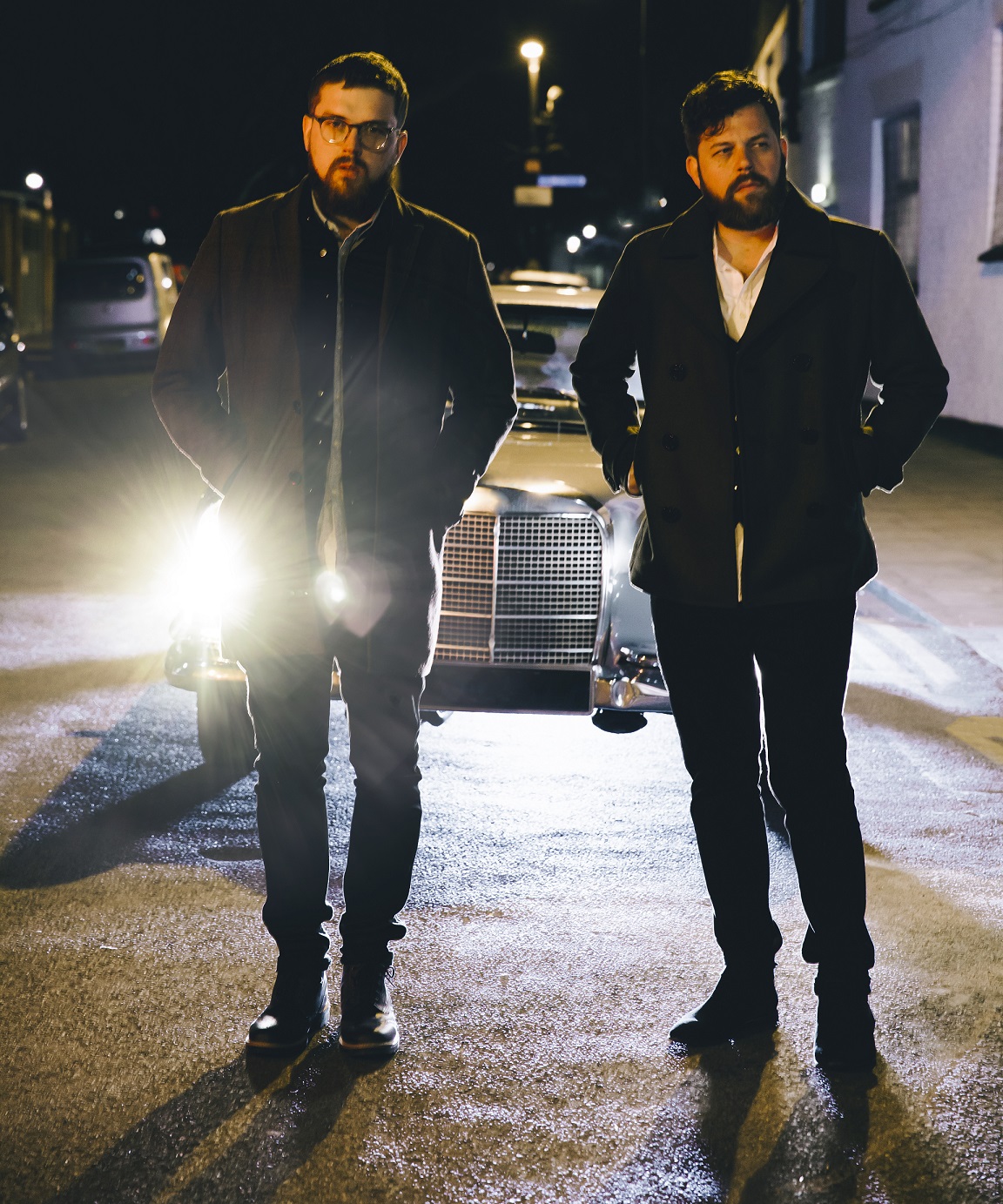
I hear Bear's Den's subject matter and music getting heavier. Do you sense that?
Davie: Yeah, I think that’s probably fair enough, yeah.
Why is that? What attracts you towards that heaviness?
Davie: It probably stems again from the idea of it being perhaps more in the present tense. I think when you’re really in the moment of something, there’s a sort of heightened sense of urgency, and so maybe naturally the level of… Aggression’s the wrong word, but the enthusiasm or energy that you bring to a performance is more intense because of something that’s going on right now, rather than something that you’ve struggled with for years, or been thinking about a lot. It’s more how do I solve this thing that’s not going the way I want it to, or whatever that is. I think there was just an urgency to the album, in that sense. Maybe using heavier instrumentation, or more robust instrumentation allows you to feel that a bit more – feel that urgency and that energy a bit more.
When you’re really in the moment of something, there’s a sort of heightened sense of urgency…
Watch: “Auld Wives” – Bear’s Den
[youtube=https://youtu.be/U2tdBAcxbBA?t=0s]Do you see Bear's Den continuing down that road in the future?
Davie: It’s really hard to know with the band. I think if we’d been asked a couple years ago if we’d have made Red Earth and Pouring Rain, I think we probably would have been like, “No!” If we’d have used the sounds that we used on that album, they probably would have felt quite alien to us then. I really enjoy the idea of making an album and then touring, and seeing what your music is telling you to do after you’ve toured it for a while. That’s how it felt with the second record, but in the same way I think we’re just as likely, at this moment in time, to do a completely acoustic thing as we are to do a heavier thing. It depends on so many factors that I don’t know we’re even that aware of. In terms of songwriting, I think we feel like we just want to keep exploring in the same way that we are and stuff, but I think that in terms of instrumentation and how we present our work, that’s something that we’re always up for challenging and learning. I think Kev and I are both just so keen on always learning: It’s always a case of, “How can we do things differently? How can we push it forward and push it into a different place?” That sort of slightly destructive, but also constructive approach to learning. Perhaps I’m learning a few things and then relearning new things; it’s really interesting and such a big part of being in a band.
I really enjoy the idea of making an album and then touring, and seeing what your music is telling you to do after you’ve toured it for a while.
I loved Austin to Boston; I really appreciated getting to see a band whose members are willing to put themselves out their, and show their humanity to their audience. What is your relationship with the idea of 'community' and with your audience?
Davie: I think the main thing for us is trying to make sure that we do as much as we can to bridge the gap between band and audience. It’s always been the biggest thing for us, I think. On like a fundamental level – back in the day, I suppose – there was this figurative distance there, in the sense that you’d sign these enormous deals and things and then you’d play shows and it all felt a bit distant. But really, the reason that we’re able to make music is because of our audiences. There’s no abstraction there: Being able to be in a room with a bunch of people who believe in what you’re doing, but are also completely supporting what you’re doing, and allowing you to be able to do it… I think it’s always been such a big thing for us to make sure that whenever we can, we get in the audience and play songs. Like, when you’re playing songs and a whole room of people are singing every word, it’s an incredible feeling. The Austin to Boston thing was so nice, and it’s really fun to not feel… I don’t know, to show the human side of just being a bunch of dudes who just write songs, rather than some alien abstract creatures who do something. We’re obviously just dudes who like music, and that’s what everyone is in the room, so it’s just really nice to be a part of that and respect it, and respect our audiences. We feel very lucky.
Is that the reason the band chose to play the venues that it did? You could have done a larger New York venue; instead, you played Rough Trade, which is such an intimate performance.
Davie: For us, we’d rather always try and make sure that the shows are intimate.. We’re obviously growing as a band, and we are playing bigger venues in certain places and things like that, and that’s amazing and we feel very lucky – it’s something that we’ve worked very hard towards. At the same time, we don’t want to lose that connection and that ability to go into the audience and perform our songs in that way. Maybe as things grow and change, maybe we’ll have to come up with different ways of maintaining that intimacy, but that’s always been so important to us. I like the removal of any wires or plugged-in stuff. Being in the room with people is so nice! It’s really humbling and you just feel like you’re all a bunch of people. Sometimes when people are singing along to like, if it’s “Bad Blood” or if it’s “Gabriel” or if it’s another song that we’re doing acoustically in the crowd, you can hear people whispering the harmony into your left ear as your performing, and it’s amazing! It’s… I can’t really describe the feeling. We just feel very lucky.
— —
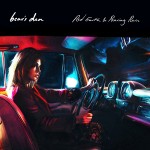
Connect with Bear’s Den on
Facebook, Twitter, Instagram
Discover more new music on Atwood Magazine
:: Bear’s Den Tour Dates ::
2016
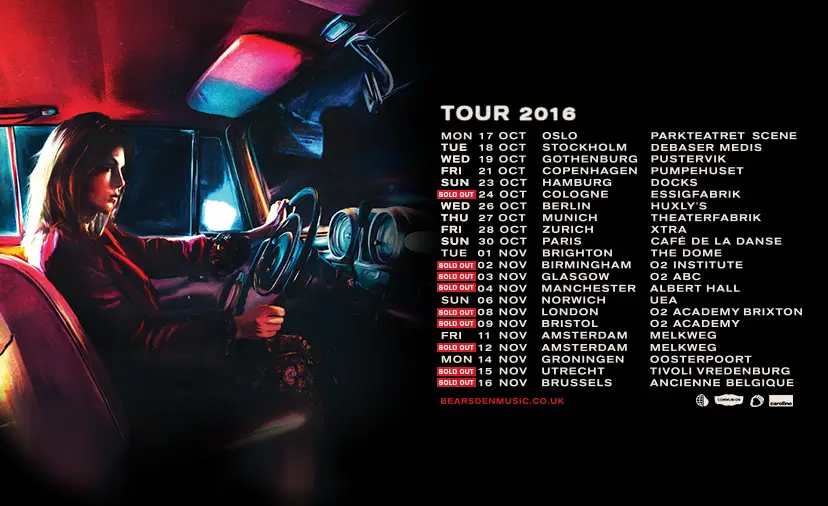
Tue 18 Oct – Debaser Medis – Stockholm, Sweden
Wed 19 Oct – Pustervik – Gothenburg, Sweden
Fri 21 Oct – Pumpehuset – Copenhagen, Denmark
Sun 23 Oct – The Docks – Hamburg, Germany
Mon 24 Oct – Essigfabrik – Cologne, Germany
Wed 26 Oct – Huxley’s – Berlin, Germany
Thu 27 Oct – Theaterfabrik – Munich, Germany
Fri 28 Oct – X-TRA – Zurich, Switzerland
Sun 30 Oct – Cafe De La Danse – Paris, France
Tue 01 Nov – The Dome Theatre – Brighton, UK
Wed 02 Nov – O2 Birmingham Institute – Birmingham, UK
Thu 03 Nov – O2 ABC – Glasgow, UK
Fri 04 Nov – Albert Hall – Manchester, UK
Sun 06 Nov – UEA – Norwich, UK
Tue 08 Nov – O2 Academy Brixton – London, UK
Wed 09 Nov – O2 Academy – Bristol, UK
Fri 11 Nov – Melkweg – Amsterdam, Netherlands
Sat 12 Nov – Melkweg – Amsterdam, Netherlands
Mon 14 Nov – Oosterpoort – Groningen, Netherlands
Tue 15 Nov – Tivoli – Utrecht, Netherlands
Wed 16 Nov – Ancienne Belgique (AB) – Brussels, Belgium
2017
